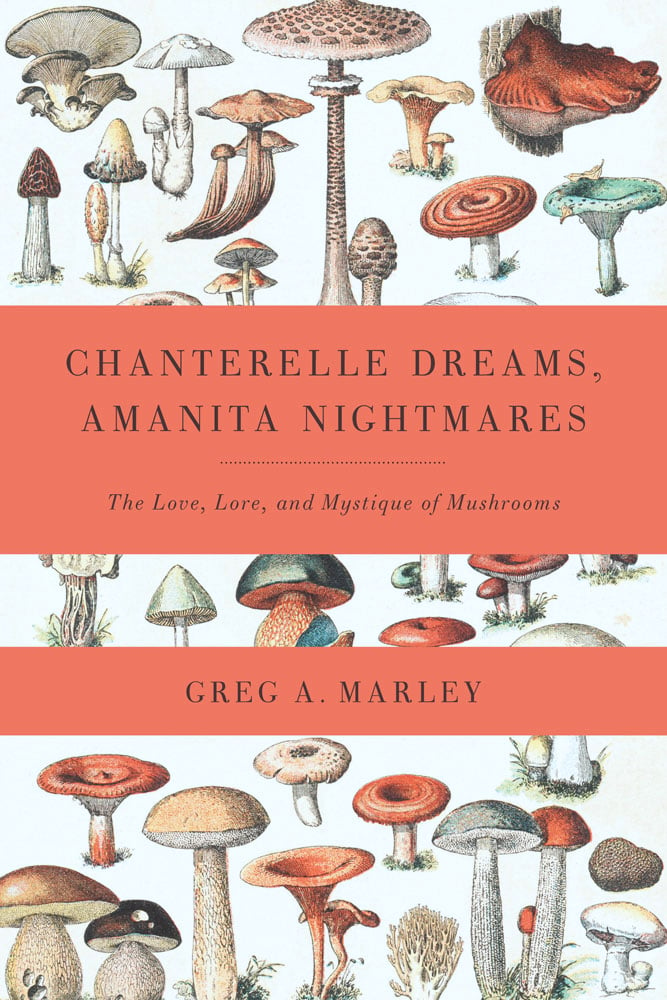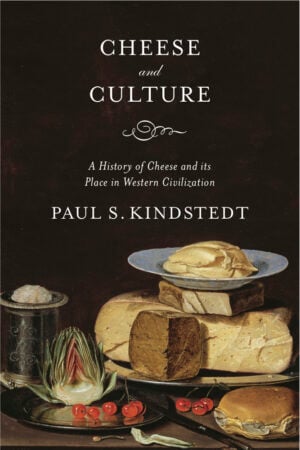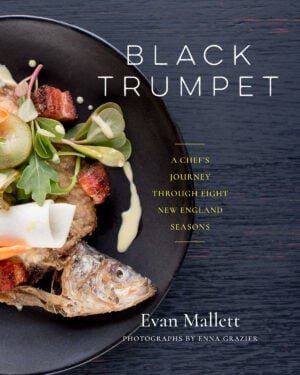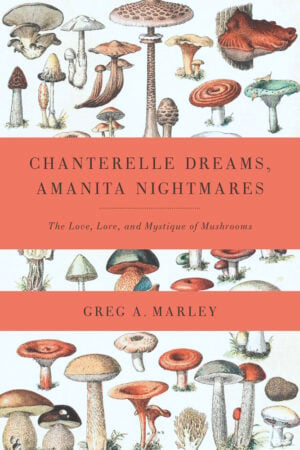EXCERPTS
| Pages: | 288 pages |
| Book Art: | 8 pages of color illustrations |
| Size: | 6 x 9 inch |
| Publisher: | Chelsea Green Publishing |
| Pub. Date: | September 9, 2010 |
| ISBN: | 9781603582148 |
Chanterelle Dreams, Amanita Nightmares
The Love, Lore, and Mystique of Mushrooms
Paperback
$24.95
*2011 Winner, International Association of Culinary Professionals Jane Grigson Award
*2011 Finalist, International Association of Culinary Professionals in the Culinary History category
Throughout history, people have had a complex and confusing relationship with mushrooms. Are fungi food or medicine, beneficial decomposers or deadly “toadstools” ready to kill anyone foolhardy enough to eat them? In fact, there is truth in all these statements. In Chanterelle Dreams, Amanita Nightmares, author Greg Marley reveals some of the wonders and mysteries of mushrooms, and our conflicting human reactions to them.
With tales from around the world, Marley, a seasoned mushroom expert, explains that some cultures are mycophilic (mushroom-loving), like those of Russia and Eastern Europe, while others are intensely mycophobic (mushroom-fearing), including, the US. He shares stories from China, Japan, and Korea-where mushrooms are interwoven into the fabric of daily life as food, medicine, fable, and folklore-and from Slavic countries where whole families leave villages and cities during rainy periods of the late summer and fall and traipse into the forests for mushroom-collecting excursions.
From the famous Amanita phalloides (aka “the Death Cap”), reputed killer of Emperor Claudius in the first century AD, to the beloved chanterelle (cantharellus cibarius) known by at least eighty-nine different common names in almost twenty-five languages, Chanterelle Dreams, Amanita Nightmares explores the ways that mushrooms have shaped societies all over the globe.
This fascinating and fresh look at mushrooms-their natural history, their uses and abuses, their pleasures and dangers-is a splendid introduction to both fungi themselves and to our human fascination with them. From useful descriptions of the most foolproof edible species to revealing stories about hallucinogenic or poisonous, yet often beautiful, fungi, Marley’s long and passionate experience will inform and inspire readers with the stories of these dark and mysterious denizens of our forest floor.
Awards
- 2011 International Association of Culinary Professionals Jane Grigson Award
- 2011 International Association of Culinary Professionals, (Culinary History)
Reviews and Praise
Booklist-
Mushroom lovers who can only get their fix by sampling the often paltry array that appears in their grocer’s produce section may be sorely tempted to indulge their mycophilia when they encounter some choice fungi in the wild. Unlike many Asian and European cultures, however, most Americans are hesitant to just pluck one off the forest floor and eat it on the spot. Perhaps such evocative names as the “Death Cap” mushroom has something to do with this mycophobia. Yet, says Marley, armed with proper background, this culinary caution can turn into complete confidence. From the fabled psychedelic “magic mushrooms” to the duplicitous appearance of “false morels,” Marley examines these fungal fiends and provides thorough descriptions of their habitat, appearance, and toxic properties to ward off potential misadventures. An avowed mycophile, Marley offers an entertaining and inquisitive look at both the heroes and villains of the kingdom Fungi in an enlightened guide that comprehensively examines their nutritional benefits, undesirable properties, and diverse cultural history.
More Reviews and Praise
Publishers Weekly-
By following a few basic guidelines, readers interested in foraging for their food will find themselves with a wealth of culinary opportunities courtesy of longtime amateur mycologist Marley (Mushrooms for Health). An enthusiastic guide, Marley introduces foragers to the most common wild edible shrooms - morels, puffballs, chicken mushrooms, and shaggy mane - as well as their more recognizable cousins in the market, such as chanterelles. Basic recipes for preparation (risottos, simple pastas, and the like) are included, enabling readers to get the most from their bounty. But Marley spends equal time with their more toxic and psychedelic brethren, describing key characteristics, common regions, and potential side effects, ensuring that initiates spend more time in the woods than the ER. While the book does have a set of color slides to aid in identification of edible and poisonous varieties, the sample pales in comparison to the many species Marley mentions.
Booklist-
“Mushroom lovers who can only get their fix by sampling the often paltry array that appears in their grocers produce section may be sorely tempted to indulge their mycophilia when they encounter some choice fungi in the wild. Unlike many Asian and European cultures, however, most Americans are hesitant to just pluck one off the forest floor and eat it on the spot. Perhaps such evocative names as the Death Cap mushroom has something to do with this mycophobia. Yet, says Marley, armed with proper background, this culinary caution can turn into complete confidence. From the fabled psychedelic magic mushrooms to the duplicitous appearance of false morels, Marley examines these fungal fiends and provides thorough descriptions of their habitat, appearance, and toxic properties to ward off potential misadventures. An avowed mycophile, Marley offers an entertaining and inquisitive look at both the heroes and villains of the kingdom Fungi in an enlightened guide that comprehensively examines their nutritional benefits, undesirable properties, and diverse cultural history.”
This book is an enticing invitation into the fungal realm, accessible and a pleasure to read. Author Greg Marley's enthusiasm is infectious, as he encourages an appreciation of fungi as essential ecological partners, and empowers readers with practical tools. These pages are filled with foraging and cultivation tips, scientific explanations, ancient lore, literary references, and entertaining stories, with the mission of transforming mycophobia into mycophilia.--Sandor Ellix Katz, author of Wild Fermentation and The Revolution Will Not Be Microwaved
Reviews and Praise
Booklist-
Mushroom lovers who can only get their fix by sampling the often paltry array that appears in their grocer’s produce section may be sorely tempted to indulge their mycophilia when they encounter some choice fungi in the wild. Unlike many Asian and European cultures, however, most Americans are hesitant to just pluck one off the forest floor and eat it on the spot. Perhaps such evocative names as the “Death Cap” mushroom has something to do with this mycophobia. Yet, says Marley, armed with proper background, this culinary caution can turn into complete confidence. From the fabled psychedelic “magic mushrooms” to the duplicitous appearance of “false morels,” Marley examines these fungal fiends and provides thorough descriptions of their habitat, appearance, and toxic properties to ward off potential misadventures. An avowed mycophile, Marley offers an entertaining and inquisitive look at both the heroes and villains of the kingdom Fungi in an enlightened guide that comprehensively examines their nutritional benefits, undesirable properties, and diverse cultural history.
Publishers Weekly-
By following a few basic guidelines, readers interested in foraging for their food will find themselves with a wealth of culinary opportunities courtesy of longtime amateur mycologist Marley (Mushrooms for Health). An enthusiastic guide, Marley introduces foragers to the most common wild edible shrooms - morels, puffballs, chicken mushrooms, and shaggy mane - as well as their more recognizable cousins in the market, such as chanterelles. Basic recipes for preparation (risottos, simple pastas, and the like) are included, enabling readers to get the most from their bounty. But Marley spends equal time with their more toxic and psychedelic brethren, describing key characteristics, common regions, and potential side effects, ensuring that initiates spend more time in the woods than the ER. While the book does have a set of color slides to aid in identification of edible and poisonous varieties, the sample pales in comparison to the many species Marley mentions.
Booklist-
“Mushroom lovers who can only get their fix by sampling the often paltry array that appears in their grocers produce section may be sorely tempted to indulge their mycophilia when they encounter some choice fungi in the wild. Unlike many Asian and European cultures, however, most Americans are hesitant to just pluck one off the forest floor and eat it on the spot. Perhaps such evocative names as the Death Cap mushroom has something to do with this mycophobia. Yet, says Marley, armed with proper background, this culinary caution can turn into complete confidence. From the fabled psychedelic magic mushrooms to the duplicitous appearance of false morels, Marley examines these fungal fiends and provides thorough descriptions of their habitat, appearance, and toxic properties to ward off potential misadventures. An avowed mycophile, Marley offers an entertaining and inquisitive look at both the heroes and villains of the kingdom Fungi in an enlightened guide that comprehensively examines their nutritional benefits, undesirable properties, and diverse cultural history.”
This book is an enticing invitation into the fungal realm, accessible and a pleasure to read. Author Greg Marley's enthusiasm is infectious, as he encourages an appreciation of fungi as essential ecological partners, and empowers readers with practical tools. These pages are filled with foraging and cultivation tips, scientific explanations, ancient lore, literary references, and entertaining stories, with the mission of transforming mycophobia into mycophilia.--Sandor Ellix Katz, author of Wild Fermentation and The Revolution Will Not Be Microwaved






